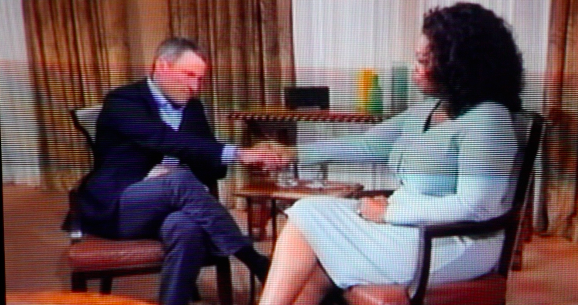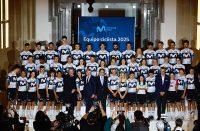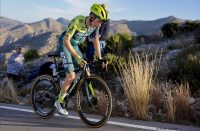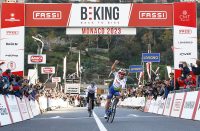LANCE ARMSTRONG-OPRAH WINFREY INTERVIEW Part 2
O: Do you feel disgraced?
L: Of course. But I also feel humbled. I feel ashamed. This is ugly stuff.
O: In October 2012 USADA stripped Lance Armstrong of his 7 Tour de France wins and banned him from elite competitions. Then came the fallout. For years sponsors lined up to associate their brands with cycling’s golden boy. Nike, Anheuser-Busch, Oakley Sunglasses, and Trek. Sponsorships that earned him tens of millions of dollars, all cut ties with Lance Armstrong. What was the humbling moment that brought you face to face with yourself?
L: I believe it was a Wednesday. Nike called. And this isn’t the most humbling moment. I’ll get to that. They said basically that they’re out. Okay. And then the calls started coming. Trek, Giro, Anheuser-Busch,
O: The same day? Next couple of days?
L: Yeah, couple of days. Everybody out. Still not the most humbling moment. Not a fun period.
O: How did that hit you?
L: You know, in a way, I just assumed it would get to that point. The story was getting out of control which was my worst nightmare. I had this place in my mind that they would be calling. The one person who I didn’t think would leave was the foundation.

O: When he was just 25 years old, Lance Armstrong was diagnosed with stage 3 testicular cancer. Doctors said his chances of survival were less than 50%. Within months of his cancer diagnosis, Armstrong started Livestrong to raise cancer awareness and empower cancer survivors. Less than 3 years after he beat the odds, he went on to win his first Tour de France. Livestrong became one of the most well known charities in the country. Lance Armstrong teamed up with Nike to introduce the now iconic yellow Livestrong bracelets. It was a genius stroke that caught on like wildfire around the world. Today 80 million wristbands have been sold. Some critics challenged Armstrong for spending too much on PR and not enough on cancer research. Others say Lance Armstrong has used the Livestrong foundation to deflect any criticism of him. Livestrong has raised nearly $500 million for cancer awareness. Last October Armstrong stepped down as chairman of Livestrong but remained on the board. In November he severed all ties to Livestrong.
L: And that was the most humbling moment. To get that call, two parts, 1. Step down as chairman, and stay on the board, stay involved. That wasn’t enough. It wasn’t enough for the people, for our supporters, and then a couple of weeks later the next call came. And we need you to step aside.
O: Not just step down, to step aside?
L: I don’t think, it wasn’t we need you to step down, it was we need you to consider stepping down for yourself. And I had to think about that a lot and this is .. None of my kids have said Dad you’re out. None of my friends have said hey, Lance you’re out. The foundation is like my 6th child. And to make that decision and to step aside, that was big.
O: They made it for you?
L: I was aware of, I wouldn’t at all say forced out, told to leave. I was aware of the pressure. Yes I had interactions with Doug and some of the board members. It was the best thing for the organization. But it hurt like hell.
O: Of everything that’s happened in this entire process, in this fall from grace, has that been the hardest?
L: That was the lowest.
O: Can Livestrong live without your story?
L: Yeah, I certainly hope so.
O: Cause your story transcends sports and gave hope to so many millions of people fighting cancer. I have this email that a friend sent to me after finding out that I was going to be doing this interview. It says that I’ve heard that he is a real jerk, meaning you.
L: Oh I know.
O: But I will always root for Lance. He gave me hope in a very dire time. My first born son had just been diagnosed with leukemia two weeks before his first birthday. And I’m in intensive care barely able to breathe and my brother sends me Lance’s new book “It’s Not About the Bike”, my journey back to life. I read it cover to cover overnight. It showed me there was hope for my son, not only to live but to thrive. I had a choice to make that night on how to respond to my son’s illness and to teach him how to face the world. My prayer for Lance as he faces his demons, he remembers it’s not about the bike.
L: Amen.
O: Are you facing your demons?
L: Absolutely. Yeah it’s a process. And I think we’re at the beginning of the process.
O: Do you think that banned substances contributed to getting cancer?
L: I don’t think so. I’m not a doctor. I’ve never had a doctor tell me that, suggest that. I don’t believe so.
Played an the old SCA deposition saying he knew if he doped everything would go away.
L: It’s sick.
O: When you look at that what do you think:
L: I don’t like that. I don’t like that guy.
O: I wanted to ask you, who is that guy?
L: That is a guy who felt invincible, was told he was invincible, truly believed he was invincible. That’s who that guy was. That guy’s still there. I’m not gonna lie to you or to the public, oh I’m in therapy, I feel better. He’s still there. Does he need to be exiting through this process? Yes. Am I committed to that process? Yes. We talked about apologies and I told you I owe a lot of people apologies. The obvious ones, the ones that we know by name, the Frankies, the Betsys, the Greg LeMonds, the Tyler Hamiltons, the Floyd Landis’, the Emma O’Reillys. I owe them apologies. And whenever they’re ready, I will give them.
O: Do you owe David Walsh an apology?
L: (laughing) That’s a good question?
O: Do you owe David Walsh an apology who for 13 years has pursued this story, who wrote for the Times of London, who has now written books about you and this entire process?
L: I could apologize to David.
O: What do you say to the woman who wrote that email and the millions of people who are wearing Livestrong bracelets whether spiritually or emotionally for themselves? What do you say to those millions of people who believed?
L: I say I understand your anger, your sense of betrayal. You supported me forever through all of this. You believed and I lied to you. And I’m sorry. I will spend and I’m committed to spending as long as I have to to make amends, knowing full well that I won’t get very many back.
O: A lot of people think you’re doing this interview because you want to come back to the sport.
L: If you’re asking me do I want to compete again? The answer’s hell yes. I’m a competitor. It’s what I’ve done my whole life. I love to train. I love to race. I love the (can’t understand) And I don’t expect it to happen.
O: You want to compete again on the bicycle?
L: (laughing)
O: You want to run races on the bike?
L: Not the Tour de France. But there’s a lot of other things that I could do but I can’t. With this penalty and with this punishment, again I made my bed. But if there was ever a window. Would I like to run the Chicago marathon when I’m 50? I would love to do that. And I can’t.
O: So right now you can’t run a marathon?
L: I can’t run any marathon. I can’t run the Austin 10k. I would love
O: Can you not run, or can you not run anything that pays you money?
L: Anything that is sanctioned. There’s 40,000 runners but if it’s sanctioned by the official governing body I cannot run it. I can’t lie to you. I’d love the opportunity to be able to compete. But that isn’t the reason that I’m doing this. Frankly, this may not be the most popular answer but I think I deserve it. Maybe not right now but if you look at the situation. If you look at the culture and you look at the sport and you see the punishments. What I told you, if I could go back to that time, that’s okay, you’re trading my story for a 6-month suspension? That’s what people got.
O: That’s what other people got?
L: What everybody got. So I got a death penalty, and they got
O: Meaning you can never compete again?
L: I’m not saying that that’s unfair necessarily, but I’m saying it’s different.
O: Do you think you’ve gotten what you deserve? For a long time you were saying everybody was on the witch hunt for you. Do you think at this moment, considering how big you were, what that meant, how much people believed what your name and brand stood for?
L: I deserve to be punished. I’m not sure that I deserve a death penalty.
O: So, was it just you being your cocky arrogant jerk self that did the tweet with you lying with all of the jerseys?
L: Yeah, that was another mistake.
O: Just weeks after being stripped of all 7 Tour de France titles and banned from elite cycling for life Lance Armstrong tweeted this photo of himself in his Austin home. He wrote, “back in Austin and just layin’ around.” Why? You are, the wolves are at the door, they’re in your house, and you tweet out that picture? What were you doing that for? What was that?
L: That was just more defiance. And you know what’s scary, is I thought it was a good idea at the time.
O: Tell me when something this gargantuan happens in your life, how has it changed the way you see yourself? Or has it?
L: Not completely. This is heavy. And this is messy and this is not something that I can sit with you and leave and go okay, we’re all good.
O: You mentioned therapy a minute ago, are you doing therapy?
L: Yeah. Over the course of my life I’ve done it sporadically. I’m the type of person that needs to not do it sporadically. It needs to be consistently. I’ve had a messy life. It’s no excuse. But this is going to be a long process.
O: So, do you have remorse? Is there real remorse or is there a sense of I’m sorry I got caught and I’m sorry I have to go through all of this?
L: Everybody that gets caught is bummed out they got caught. I am only starting. I will continue. When this comes out, the ripple effects,
O: Are people analyzing?
L: And people that still are sitting there today that are true believers. They’re going to hear something totally different. Do I have remorse? Absolutely. Will I continue to? Will it grow? Absolutely. For me this is just the first step. Again, these are my actions, I’m paying the price but I deserve it.
O: What you hope is that it leaves an impression that causes a shift or a change within you. Has that happened with you yet?
L: I’d be lying if I said that it had. Again I keep going to this word, this idea process. I got work to do. There’s not going to be one tectonic shift here that says okay he’s on his way.
O: Were there people who cared about you who knew about this? Who wanted you to stop it? Stop the lying, stop the doping?
L: Of course.
O: Was there anything they could have said or done?
L: Probably not. I’m going to name
O: Lance and Kristen Armstrong were divorced after 5 years of marriage. They have 3 children together, 13 year old son Luke, 11 year old twin daughters Isabelle and Grace. Armstrong has two other children with his girlfriend of 5 years now Anna Hansen, 3 year old Max and 2 year old Olivia.
L: If I could say one name it would be Kristen. She was, she’s a smart lady, she’s extremely spiritual, she believes in honesty and integrity and the truth. She believes that the truth will set you free. We believe differently on a lot of things. She may come from her religious standpoint where I may not. It doesn’t matter. We have 3 kids together. They deserve the honest truth. They deserve a dad that is viewed as telling the truth to them, to the public. Anna has always wanted that. She doesn’t know that whole story back then because we weren’t together.
O: Was there anybody who knew the whole truth? Have you told anybody the whole truth?
L: (laughing) yeah
O: Let’s go back to Kristen. She was aware of what was going on?
L: mm hmm
O: Had she had conversations with you about stopping or getting out or?
L: I saw her at the kids’ game two days ago and I said if this comes up can I talk about this? And she said yes. She was not that curious. Perhaps she didn’t want to know. She certainly knew, didn’t need to know basis. I guess maybe I protected her a little bit from that. The thing about her and my doping and this comeback-she was the one person that I asked if I could do that.
O: If you could come back?
L: If I’m going to do this, was a big decision, I need her blessing. And she said to me, you can do it, under one condition, that you never cross that line again.
O: the line of drugs?
L: Yes, and I said you got a deal. And I never would have betrayed that with her. It was a serious ask, it was a serious commitment. She gave me her blessing. If she would have said no, I don’t like this idea, I would not have done it. But I gave her my word and I did stick to it.
O: So you came back and you were willing to, you said to me at the beginning of our conversation, that you didn’t believe it was possible to win 7 in a row without doping. So you came back, not going to dope, not going to do blood transfusions, and you expected to win still?
L: Yes. I thought and I still think that the sport was very clean. There really was a major shift in the mid-2000s with the bio passport.
O: So you thought you were coming back into a clean sport?
L: And a level playing field.
O: How was it for you to come in third? You who loves to win at all costs?
L: I didn’t expect to get third. I expected to win. Like I always expected. And at the end I said to myself you know I just got beaten by two guys that are better. That’s why we have the events. I know that doesn’t sound like something I would say. I did everything I could in training and I just got beat.
O: What do you tell Luke? Luke’s 13. You’ve been fighting this thing his entire life. What do you tell Luke? He’s 13, he’s old enough to know.
L: Trust me, they know a lot. They hear it in the hallways.
Oprah: And the girls?
L: And the girls. Their school, their classmates, have been very supportive. Where you lose control with your kids is when they go out of that space. Instagram and Facebook, Twitter. Then the feedback comes.
O: What did you tell him?
L: First I want to tell you what happened. When this all really started, I saw my son defending me and saying that’s not true. What you’re saying about my dad is not true. And it almost goes to this question of why now? (Long pause, Armstrong is pretty choked up.) that’s when I knew I had to tell him. And he’s never asked me. He never said, dad, is this true? He trusted me.
O: What did you say to him?
L: At that time I didn’t say anything. But that’s the time that I knew that I had to say something.
O: You heard that he was defending you?
L: Through other kids. On Instagram reply. At that point I decided I had to say something. This is out of control. And then I had to have a talk with him which was just here over the holidays.
O: What did you say?
L: I said, listen, there’s been a lot of questions about your dad, my career, whether I doped or did not dope. I’ve always denied that. I’ve always been ruthless and defiant about that. You guys have seen that. That’s why you trusted me on it. Which makes it even sicker. And I said I want you to know that it’s true. And there was the girls who are 11, they’re twins, as you know and Luke. And they didn’t say much. They didn’t say wait dad, they just accepted it. And I told Luke I said (pause, choked up)I said don’t defend me any more. Don’t.
O: How’d he take it?
L: He’s been remarkably calm and mature about this. I said if anybody says anything to you, they’re going to see this. So if a kid does something, do not defend me, just say, hey my dad said he was sorry. He said okay.
O: Did he say anything?
L: He just said, look, I love you, you’re my dad, this won’t change that. I expected, I guess you always expect something.
O: Defiance- Did you expect defiance?
L: From him?
O: Yeah. Anger? Disappointment?
L: Thank god he’s more like Kristen than like me.
O: Are you hoping with this conversation, your admission, your saying you wish you’d done things differently with USADA, that your lifetime from competition will be lifted?
L: Selfishly, yes. But realistically I don’t think that’s going to happen. And I have to live with that.
O: Certainly people are discussing, there’s been a lot of talk about why you’re doing it, what you were going to say and how you were going to say it. What was your intention or hope that would come out of it?
L: The biggest hope and intention was the well-being of my children. The older kids need to not be living with this issue in their lives. That isn’t fair for me to have done to them. And I did it. And also for the little ones. They have no idea. They’re 2 and 3. They obviously have no idea. But they will learn it. This conversation will live forever. Everything that we do today, that dumb tweet with the yellow jerseys, lives forever. So I got to get that right for them as they enter the depth of their lives.
O: Taggert told 60 Minute Sports that someone on your team offered USADA a donation that they did not accept. He said it was over $150,000. Were you trying to pay off USADA?
L: No. That’s not true. In the 1000 page Reasoned Decision that they issued, there was a lot of stuff in there, everything was in there, why wasn’t that in there? Pretty big story. Nope, it’s not true.
O: No one representing you?
L: Nobody. I had no knowledge of that. But I’ve asked around. Not true.
O: And you are Lance Armstrong and you run your own show so if somebody was going to offer $150,000 you should know it?
L: And I think the claim was $250,000. That’s a lot of money. I would know.
O: And you are saying to me that is not true?
L: That is not true.
O: What has been the cost? The financial cost? Have you lost everything?
L: I’ve certainly lost all future income. You could look at the day, two days or day and a half when people left. I want to give you a number. You asked me if there’s a cost. I don’t like thinking about it. That was a $75,000,000 day.
O: That just went out of your life?
L: Gone. And probably never coming back.
O: Were you ever in a position where you felt like wow, I don’t want to get out of bed? I know you’ve been running and talking. Did it hit you to the point of I don’t know what to do?
L: I’ve been to a dark place that was not my doing. I’ve been to a place where I didn’t know if I was going to live a month, 6 months, a year, if I had 10 years. It’s helped me now. This is not a good time. But it isn’t the worst part of my life. You cannot compare this to a diagnosis, an advanced diagnosis, 50-50 odds. That sets the bar. It’s close. But I’m an optimist. And I like to look forward. This has caused me to look back. My mom and I are the same in that regard. She doesn’t look back. We don’t talk about the past. We don’t talk about what happened. I don’t ask her about my biological father. We just don’t go there. That was yesterday.
O: How is she handling all of this?
L: She’s a wreck.
O: So people who love you, take it as hard as you do? And harder?
L: You’re right. She’s not the type of person that would call me up and say Lance, I’m a wreck. But my stepfather called me and said your mom’s having a really hard time. I said, I’m sure. She’s a tough lady. She’s gotten through every other tough moment in her life.
And then we were face-timing with my kids(her grandkids) back and forth and I saw my mom. And I thought, oh, this woman is a wreck.
O: This has hit her hard?
L: Yes. And it took seeing her to really understand that this has taken a toll on her life.
O: And there are others. You spoke about all those people. Are you in a place now where you can Before obviously that guy wasn’t even aware that what you were doing and how that was affecting other people.
L: No idea.
O: So in that way that was bully sociopathic only obsessed with yourself narcisistic behavior, you would say that?
L: Yes.
O: Are you now in a space , have you called former friends, friends, associates, last night to apologize? Are you in a space where you’re not just apologizing but you can begin to feel how you shattered other peoples’ lives? Are you in that space yet?
L: Yeah. Yeah, yeah. I don’t need to be back in that place where I can slip like that and take things for granted, abuse priviledge. And to go back to my, if I had one of my kids, we watched those tapes. If I had one of my kids act like that I’d be apoplectic.
O: When you’re famous, people like to see the rise, the heroic rise, and they also love to see you stumble and fall. Will you rise again?
L: I don’t know. I don’t know what’s out there. I go to this thing and I do not know the outcome here. I’m getting comfortable with that. That would have driven me crazy in the past. I’m getting there. I don’t know. I’m deeply sorry for what I did. I can say that thousands of times. It may never be enough to get back. You’re asking me if I can come back.
O: More importantly than your comeback, I’m not as interested in your comeback to the sports world. I’m more interested in what’s going to happen to you as a man, as a human being. Are you a better human being today because this happened? Did this help you become a better human being?
L: Without a doubt. And again, this happened twice in my life. When I was diagnosed, I was a better human being after that. And I was a smarter human being after that. And then I lost my way. And here’s the second time. It’s easy to sit here and say I feel different, I feel smarter, I feel like a better man today, but I can’t lose my way again. Only I can control that. I’m in no position to make promises. I’m going to slip up every now and gain. That is the biggest challenge for the rest of my life is to not slip up again. And to not lose sight of what I got to do. I had it. And things got too big. Things got too crazy. I got a big challenge.
O: It’s an epic story. What’s the moral to the story?
L: I don’t have a great answer there. I can look at what I did-cheating to win bike races, lying about it, bullying people. Of course you’re not supposed to do those things. That’s what we teach our children. That’s the easy thing. There’s another moral to this story and I think for me I just think it was about that ride and about losing myself and getting caught up in that. And doing all those things along the way that just enabled that. And then the ultimate crime is the betrayal of these people that supported me and believed in me and they got lied to.
O: Thank you for trusting me to do this. You know what I hope the moral of the story is? I hope the moral to the story is what Kristen told you in 2009. The truth will set you free.
L: Yeah. She continues to tell me that.
Thank you.




